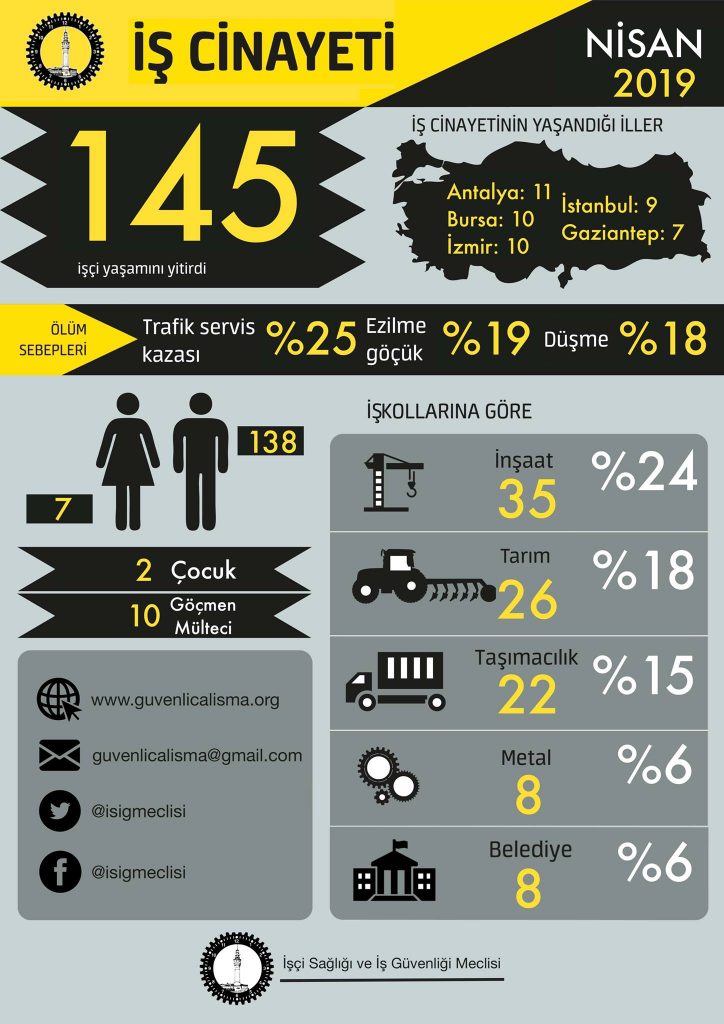7th-13th May

Detentions of irregular migrants in Turkey | Situations in the Aegean Sea | Push-Backs from Greece | Working conditions in Turkey | New wall at Turkish-Syrian border | Afghan entrepreneurs in Esenyurt, Istanbul
Perspectives
Numbers & Media Coverage of Detentions of Irregular Migrants in Turkey
Birgün has reported on the figures released by the Ministry of Internal Affairs of numbers of migrants in Turkey. According to the reports, in the first four months of 2019 (January until April) the numbers of migrants crossing to the Greek islands decreased by 17.6 percent compared to the previous year. Further, a total of 79,002 migrants – among which were 32,942 Afghans, 11,691 Pakistanis and 6,432 Syrians – were arrested during the same period. The internal ministry reports that the number of detentions decreased by 2.44 percent, while the number of deportation increased by 34 percent compared to the same period in 2018. The Turkish Interior Ministry recorded a total of 268,000 arrests of irregular migrants in 2018.
Meanwhile, Anadolu Agency, Turkey’s state-run news agency, continues to report on arrests of irregular migrants throughout the country. Last weekend Anadolu reported that at least 757 migrants had been arrested on Saturday alone – several groups in the Edirne province at the Greek-Turkish land border and other groups along the Aegean coast in the provinces of Aydın and Izmir. In another incident Birgün reported, the Gendarmerie stopped a truck carrying 126 Afghan and Pakistani migrants around Van, who were brought to the Provincial Directorate of Migration Management (PDMM). The driver was arrested for alleged human smuggling. The wording is interesting here, as Anadolu often abstractly speaks of migrants ‘being held’ and not arrested. Further, while the independent news agency provides numbers and nationalities of those apprehended, they fail to mention what happens to the migrants after the arrests.
News&Reports
On the Situation in the Aegean Sea
While, according to the Turkish Interior Ministry, the number of boat crossings through the Aegean Sea have decreased compared to the beginning of 2018, Greece became the country with the highest migrant arrivals in 2019 so far. Out of a total of more than 21,000 migrants who safely reached European shores this year 11,014 arrived in Greece (and 8,943 in Spain) as of 13 May 2019, according to the UNHCR. So far this year 443 people have already lost their lives in their attempt to seek safety in Europe. The death rate is therefore at 2.1 percent, meaning that 1 in 50 people who tried to cross the Mediterranean died.
The two Spanish rescue organizations ‘Salvamento Marítimo Humanitario’ and ‘Proactiva Open Arms’ who for months had both been denied permission from Spain to set sail in order to conduct search and rescue operations in the Central Mediterranean, have decided to deliver humanitarian aid to the Greek Aegean Islands. You can find more on their mission in a recent article from Info Migrants.
On Push-backs from Greece around the Evros region
In last weeks’ digest, we reported on violent pushbacks at the Greek-Turkish land border that were largely affecting the Turkish asylum seekers who were trying to flee the country. Euronews followed up on these stories and recently published a comprehensive article on the topic. According to Euronews, the UNHCR and the EU Commissioner for Human Rights of the Council of Europe have urged Greek authorities to investigate those reports. “The Commission expects that the Greek authorities will follow up on the specific allegations and will continue to closely monitor the situation.” However, instead of pushing Greek authorities to finally put an end to these unlawful practices, Europol – the law enforcement agency of the EU – announced that they would deploy Europol officers “to assist the local Greek Police in Evros to tackle the increasing incidence of migrant smuggling from Turkey”. This move again reinforces the continued hypocrisy in EU border politics. While the EU Commissioner for Human Rights voices concern and asks for consequences, the EU deploys police support without mentioning the increasing push-backs, which are a clear breach of international law, or rather the non-refoulement principles of the 1951 Geneva Convention.
On Working Conditions in Turkey
ISIG Meclisi, Health and Safety Labour Watch Turkey, have released numbers of death due to accidents at work. Out of a total of 145 workers who died in April alone, 10 were migrants, or rather refugees.

On Developments at the Syrian-Turkish Border
According to Kurdistan24, Turkey has started building a concrete wall around Afrin. The news site cites a Kurdish official saying that “the wall will separate Afrin city, and most of its countryside from the Syrian territories and they will be added to Turkish territory. By building the wall, Turkey is trying to gain legitimacy for its occupation of the Syrian territories.” People have already been expelled from their village by construction vehicles destroying their olive tree fields and houses to make space for the wall, it was claimed. The Syrian regime as well as Russian forces haven’t publicly commented on the matter, which indicates that Turkey is using the international silence and silence of the Syrian regime. These recent developments fit Erdoğan’s discourse of ‘clearing the Kurdish “terror-infested” regions of Syria giving “4 million Syrians the chance to return home.”’
At the same time, more and more Syrians are reaching refugee camps in Northern Syria due to intensified attacks by the Syrian regime and Russia. According to Daily Sabah, a newspaper which is closely aligned to the Turkish government, the number of refugees in the ‘Atmeh’ refugee camp, located near Turkey’s border district of Reyhanlı, is already at 600,000 with many new refugees arriving since late April, mainly from the Idlib region.
People & Stories
Asharq Al-Awsat Newspaper have published a piece about how entrepreneurs from Afghanistan are opening businesses in Istanbul’s Esenyurt district:
“Afghan refugee entrepreneurs appear to be increasingly finding success in Turkey, where they bring to the local economy, not only their savings, but sought-after know-how, whether in restaurants, commerce or skilled crafts and specialties. In turn, Turkey offers refugees simplified administrative procedures for setting up a new business.”
